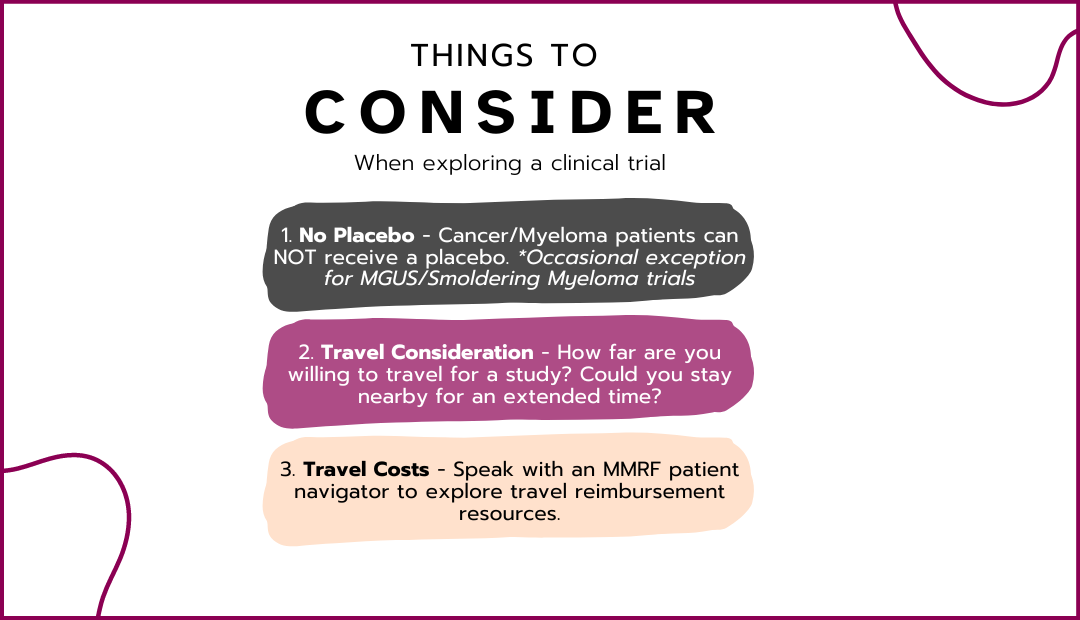Iberdomide and Daratumumab As Maintenance Therapy After an Autologous Stem Cell Transplant for Multiple Myeloma
NCT06107738
Age 18 +
Sex Both
Phase Phase 2
Third Opinion Trial Synopsis
In this clinical study, researchers are exploring a new treatment approach for patients with a specific type of blood cancer. The study focuses on a combination of therapies that aim to improve patient outcomes and potentially lead to better management of the disease. Here are some key points about the study:
- The treatment involves a unique combination of existing therapies, which may enhance their effectiveness when used together.
- Patients will be monitored closely to assess how well the treatment works and to identify any side effects.
- This study is designed to include a diverse group of participants, which may help researchers understand how different individuals respond to the treatment.
- One of the unique aspects of this trial is its focus on personalized medicine, tailoring the treatment based on individual patient characteristics.
- The study aims to provide insights into the best ways to manage the disease and improve the quality of life for patients.
Third Opinion AI Generated Synopsis
Trial Summary
The goal of this phase 2 clinical trial is to learn if patients with Multiple Myeloma who are minimal residual disease positive after initial therapy (including an autologous stem cell transplant \[ASCT\]) will benefit from maintenance therapy with Iberdomide and subcutaneous (SC) Daratumumab. The main questions it aims to answer are: * Assess if giving Iberdomide and the SC Daratumumab in the maintenance setting is an effective treatment and warrants further investigation in patients with residual disease * Is giving Iberdomide and SC Daratumumab maintenance post ASCT a safe option Participants will: * provide informed consent and complete screening assessments for eligibility within 28 days of starting treatment * Screening assessments include specific laboratory tests, a medical history assessment and a physical examination (including temperature, pulse, blood pressure, respirations, height and weight), an assessment of your heart function, a breathing test, cancer imaging, a bone marrow biopsy, minimal residual disease testing (MRD) and a questionnaire * If eligible, patients will start treatment with Iberdomide (1.0 mg on day 1-21 of each 28 day cycle, with an increase to 1.3 mg on Cycle 4 if the 1.0 mg dose was tolerated, to a maximum of 26 cycles or progressive disease, whichever is first) and SC Daratumumab (1800 mg SC on days 1, 8, 15 and 22 of cycle 1 and 2, then 1800 mg SC on Day 1 and 15 of cycle 3-6 and 1800 mg SC on Day 1 for cycles 7-26 to a maximum of 26 cycles or progressive disease, whichever is first) * while receiving treatment on study, physical exams (including temperature, pulse, blood pressure, respirations, height and weight), toxicity assessments, laboratory assessments and questionnaires will be done at various times over the course of the 26 cycles * an MRD assessment is required at 6, 12 and 24 months after starting treatment * End of treatment will occur once 26 cycles are completed, or cancer has progressed whichever comes first. At that time, specific laboratory tests, a physical examination (including temperature, pulse, blood pressure, respirations, height and weight), cancer imaging, a bone marrow biopsy and minimal residual disease testing (MRD) will occur.
The goal of this phase 2 clinical trial is to learn if patients with Multiple Myeloma who are minimal residual disease positive after initial therapy (including an autologous stem cell transplant \[ASCT\]) will benefit from maintenance therapy with Iberdomide and subcutaneous (SC) Daratumumab. The main questions it aims to answer are: * Assess if giving Iberdomide and the SC Daratumumab in the maintenance setting is an effective treatment and warrants further investigation in patients with residual disease * Is giving Iberdomide and SC Daratumumab maintenance post ASCT a safe option Participants will: * provide informed consent and complete screening assessments for eligibility within 28 days of starting treatment * Screening assessments include specific laboratory tests, a medical history assessment and a physical examination (including temperature, pulse, blood pressure, respirations, height and weight), an assessment of your heart function, a breathing test, cancer imaging, a bone marrow biopsy, minimal residual disease testing (MRD) and a questionnaire * If eligible, patients will start treatment with Iberdomide (1.0 mg on day 1-21 of each 28 day cycle, with an increase to 1.3 mg on Cycle 4 if the 1.0 mg dose was tolerated, to a maximum of 26 cycles or progressive disease, whichever is first) and SC Daratumumab (1800 mg SC on days 1, 8, 15 and 22 of cycle 1 and 2, then 1800 mg SC on Day 1 and 15 of cycle 3-6 and 1800 mg SC on Day 1 for cycles 7-26 to a maximum of 26 cycles or progressive disease, whichever is first) * while receiving treatment on study, physical exams (including temperature, pulse, blood pressure, respirations, height and weight), toxicity assessments, laboratory assessments and questionnaires will be done at various times over the course of the 26 cycles * an MRD assessment is required at 6, 12 and 24 months after starting treatment * End of treatment will occur once 26 cycles are completed, or cancer has progressed whichever comes first. At that time, specific laboratory tests, a physical examination (including temperature, pulse, blood pressure, respirations, height and weight), cancer imaging, a bone marrow biopsy and minimal residual disease testing (MRD) will occur.
from ClinicalTrials.gov
Locations & Contact
Fill out the form and to let the Multiple Myeloma Research Foundation know you are interested in this trial.
Contacts:

